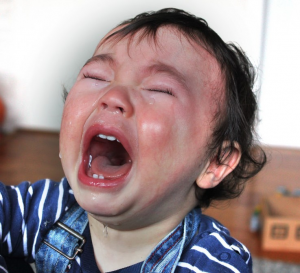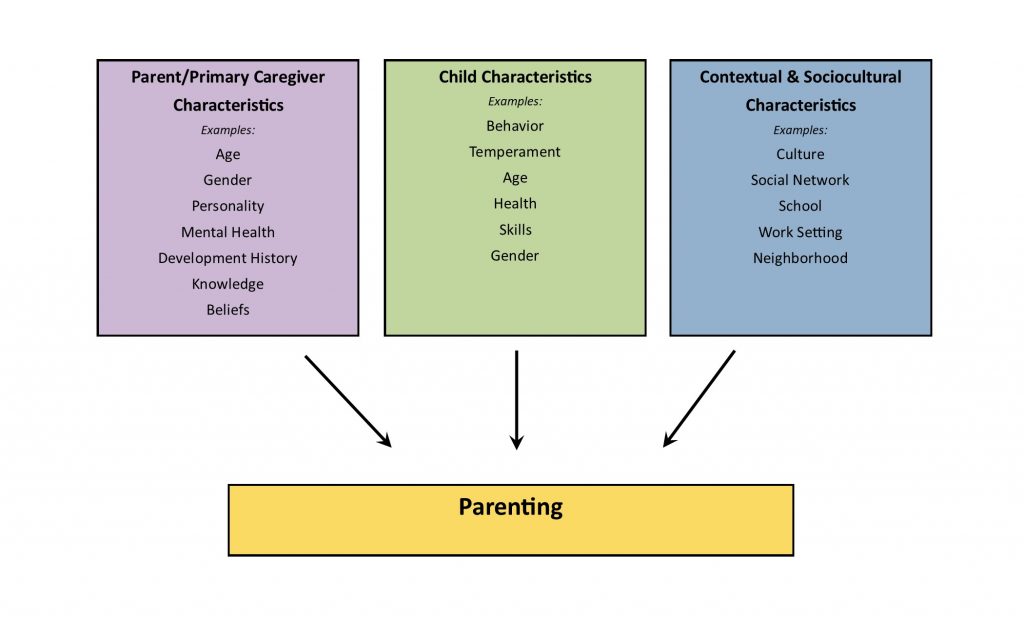Which Factor Is a Cause of Diversity in Families?
Influences on Parenting
Diana Lang and Marissa L. Diener
Parenting is a complex process in which parents and children both impact one some other. There are many reasons that parents conduct the style they do. The multiple influences on parenting are yet being explored. Proposed influences on parental behavior include:
- parent characteristics,
- kid characteristics, and
- contextual and sociocultural characteristics.[1] [ii]
Parent Characteristics
Parents bring unique traits and qualities to the parenting relationship that affect their decisions as parents. These characteristics include a parent'south age, gender identity, personality, developmental history, beliefs, knowledge about parenting and kid development, and mental and physical health. Parents' personalities also affect parenting behaviors. Parents who are more agreeable, conscientious, and outgoing are warmer and provide more than structure to their children. Parents who are more than agreeable, less broken-hearted, and less negative besides support their children's autonomy more than parents who are anxious and less agreeable.[3] Parents who have these personality traits appear to be better able to reply to their children positively and provide a more than consistent, structured environment for their children.
Parents' developmental histories, or their experiences equally children, can likewise affect their parenting strategies. Parents may acquire parenting practices from their own parents. Fathers whose own parents provided monitoring, consistent and age-appropriate discipline, and warmth are more likely to provide this constructive parenting to their ain children.[iv] Patterns of negative parenting and ineffective discipline also appear from one generation to the next. However, parents who are dissatisfied with their primary caregivers' approach may be more probable to change their parenting methods when they accept children.
Kid Characteristics

Parenting is bidirectional. Not only do parents and caregivers bear upon their children, but children influence their parents/primary caregivers as well.[five] Child characteristics, such as gender identity, birth gild, temperament, and wellness status, can affect kid-rearing behaviors and roles. For example, an infant with an easy temperament may enable caregivers to feel more than effective, equally they are hands able to soothe the child and elicit smiling and cooing. On the other hand, a cranky or fussy baby tin can elicit fewer positive reactions from caregivers and may result in parents feeling less constructive in the function.[half dozen] Over fourth dimension, parents of more difficult children may become more punitive and less patient with their children.[seven] [8] Many parents who have a fussy, hard kid take been found to be less satisfied with their relationships and have greater challenges in balancing work and family roles.[9] Thus, child temperament is one of the kid characteristics that influences how caregivers behave with their children.
Another child characteristic is the child's gender identity. Some parents assign dissimilar household chores to their children based on their child'due south gender identity. For case, older research has shown girls are more than often responsible for caring for younger siblings and household chores, whereas boys are more likely to exist asked to perform chores outside the home, such as mowing the lawn.[10] Inquiry has also demonstrated that some parents talk differently with their children based on their kid'southward gender identity, such as providing more scientific explanations to their sons and using more emotion words with their daughters.[11]
Contextual Factors and Sociocultural Characteristics
The parent-kid human relationship does not occur in isolation. Sociocultural characteristics, including economic hardship, religion, politics, neighborhoods, schools, and social support, can also influence parenting. Parents who feel economic hardship tend to be more easily frustrated, depressed, and sad, and these emotional characteristics can affect their parenting skills.[12] Civilisation can also impact parenting behaviors in fundamental means. Although promoting the development of skills necessary to function effectively in ane's community, to the all-time of ane's abilities, is a universal goal of parenting, the specific skills necessary vary widely from civilisation to culture. Thus, parents have different goals for their children that partially depend on their culture.[13] For example, parents vary in how much they emphasize goals for independence and individual achievements and goals involving maintaining harmonious relationships and being embedded in a potent network of social relationships.

external, sociocultural characteristics.
These differences in parental goals can likewise exist influenced by culture and immigration status. Other of import contextual characteristics, such equally the neighborhood, schoolhouse, and social networks, can affect parenting, fifty-fifty though these settings do not always include both the child and the parent.[fourteen] For example, Latina mothers who perceived their neighborhood as more dangerous showed less warmth with their children, perhaps because of the greater stress associated with living in a threatening surround.[xv]
Summary: Many Factors Can Influence Parenting and Child Outcomes
Parenting factors include characteristics of the primary caregiver, such as gender identity and personality, besides as characteristics of the child, such as age and temperament. Parenting styles provide reliable indicators of parenting functioning that predicts child well-being across a wide spectrum of environments and various communities. Caregivers who consistently engage in high responsiveness and appropriate demandingness with children are linked to more than "quality" outcomes for youth.
The interaction among all these factors creates many unlike patterns of parenting behaviors. For instance, parenting influences a child's development as well as the development of the parent or primary caregiver. And, as parents face new challenges, they change their parenting strategies and construct new aspects of their identities. Furthermore, the goals and tasks of parents may change over time as their children develop.[16] [17] However, the adjacent page outlines typical parenting tasks, roles, goals, and responsibilities that extend across cultures and time.
Source: https://iastate.pressbooks.pub/parentingfamilydiversity/chapter/influences-on-parenting/
0 Response to "Which Factor Is a Cause of Diversity in Families?"
Post a Comment